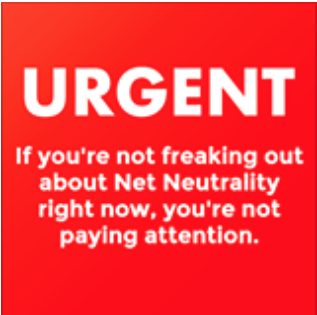
You know that over the past few months, I’ve been sharing increasingly enraged material about the FCC’s horrible ruling on net neutrality.
If this travesty goes forward, it can profoundly affect the service we provide in all libraries. You know that nice internet we have? It’s keen. People like it. They may come to our library just to use the internet. Computers are a thing, the internet is important, and taking away our access to it is a significant problem.
What does net neutrality mean? The short version is that internet providers will be able to happily charge us whatever they want to get to different websites, they can block our access entirely to websites they do not support, and can slow our internet to a crawl whenever they want.
Like Facebook? That’s probably going to cost extra. Ever been to Google? Have a Gmail account? Good luck getting to that if you have the wrong internet provider. Watch cute kitten videos? Be prepared to end that hobby unless you pay for the “fast lane” access.
 Seriously – lose your mind over this. It’s absolutely worth it.
Seriously – lose your mind over this. It’s absolutely worth it.
Here’s a quick look at an article from American Libraries journal. Click here to go to the full text to get a better idea of the developing issues. You can also browse the American Library Association’s website to get more information about the library’s stand here.
“On February 1, a three-judge panel of the US Court of Appeals for the D.C. Circuit heard oral arguments about whether the Federal Communications Commission (FCC) was arbitrary and capricious in reversing its 2015 order, which included rules against blocking, throttling, or paid prioritization of internet access. In the case—Mozilla et al v. Federal Communications Commission (FCC)—consumer groups and some companies are trying to restore the net neutrality protections policy that is needed to keep the internet open to all users. How will the upcoming decision affect libraries?
The American Library Association (ALA), which filed an amicus brief in 2018 with other groups seeking to defend net neutrality in Mozilla, asserts net neutrality is essential for a library to meet its public mission of increasing access to information. In 2015, the FCC adopted strong net neutrality policies to require all internet traffic to be treated equally. But the agency did an about-face and eliminated those policies in 2017.
ALA has been on the front lines of the net neutrality battle with the FCC, Congress, and the federal courts for more than a decade, working in coalition with other library and higher education organizations as well as broader coalitions of net neutrality advocates.
…
At the same time, the internet moves on. For the most part, internet service providers (ISPs) are treading carefully while legislation is pending. But instances of misbehavior have concerned net neutrality advocates.
In 2018, David Choffnes, assistant professor of computer and information science at Northeastern University in Boston, and his fellow researchers developed an app to measure if ISPs regularly throttle streaming services like YouTube and Netflix. The results? Nearly every major wireless provider specifically throttles video, even when the network is perfectly capable of handling the load. In a statement last fall, Choffnes pointed out, “There’s no evidence that any of these policies are only happening during network overload. They’re throttling video traffic even when the network doesn’t need to. It happens 24/7, and in every region where we have tests.”
Verizon, the largest mobile wireless carrier in the US, was the biggest offender on Choffnes’s app, with more than 11,000 instances of throttling between January and May 2018. AT&T, the second largest carrier, had almost 8,400 instances of throttling. Sprint was found to be throttling traffic from Skype. While we do not know how the FCC would have responded to these incidents under strong net neutrality rules, the 2015 rules made it less likely that companies would engage in this kind of behavior in the first place. Those rules also had expedited procedures for dealing with incidents where an ISP may be violating net neutrality principles—critical for institutions like libraries and consumers, neither of which have the resources for a drawn-out process.”








